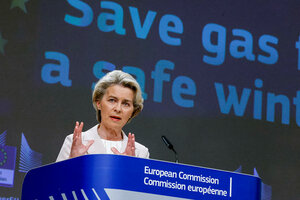EU seeks solidarity to withstand Russian gas cutoff

European Commission President Ursula von der Leyen speaks at a news conference in Brussels on July 20, 2022. She accused Russia of "blackmailing" the European Union by withholding energy supplies.
Yves Herman/Reuters
London
It has been decades in the making, a cooperative partnership based on an assumption audaciously out of sync with current world politics: that countries can be persuaded to forgo their national interests, even some of their sovereignty, in defense of shared values and common goals.
But that assumption at the heart of the 27-member European Union is now being tested as rarely before.
And how successfully the union hangs together will have implications beyond the EU itself. Russian President Vladimir Putin clearly hopes that the cracks will widen, thus weakening the Western pushback against his invasion of Ukraine. The Biden administration – and war-battered Ukraine – are trusting that unity will prevail.
Why We Wrote This
Cooperation is at the core of the European Union’s identity. Can the bloc withstand Moscow’s use of oil and gas as levers to shatter its unity?
The immediate crisis concerns energy. Russia has reduced its deliveries of the natural gas that is critical to a number of the EU’s member states, including its most powerful economy, Germany. Soaring gas costs have slowed the bloc’s growth and sharply driven down the value of the EU currency, the euro.
Russia began pumping gas again this week after a 10-day suspension for maintenance on the Nord Stream 1 pipeline, but only at 40% of traditional levels.
The even deeper concern is that Mr. Putin could halt gas supplies completely, especially as next winter’s cold begins to bite. And that’s where the main challenge to Europe’s unity comes in.
The EU’s best hope of cushioning the effects of a total cutoff is to cooperate in a common strategy among member states. This would include immediate consumption cuts so as not to run down stocks, coordinated gas purchases from other countries, possibly rationing, and, perhaps most importantly, a willingness in countries less dependent on Russian gas to share what they have with those under more immediate threat.
Such cooperation would be a delicate task even in the best of political circumstances. Some internal tension is inherent in the EU, which is based on persuading member states to balance their national priorities with those of more than two dozen sovereign neighbors.
The gas crisis, however, has hit at a time of political flux in the EU. The main facilitator of compromise in years past – former German Chancellor Angela Merkel – has gone. In France, the EU’s other heavyweight, recent elections have left President Emmanuel Macron without a working majority in parliament.
And on Thursday, an 18-month-old unity coalition collapsed in Italy, which is another major customer for Russian gas. It had been led by Mario Draghi, a former head of the European Central Bank vocally supportive of the EU’s tough stand on the Ukraine war.
While EU governments have long anticipated a tighter supply of Russian gas, they haven’t yet done much to coordinate their responses. Individual states have been scrambling to do their own deals with alternative suppliers.
Still, the EU’s own central cabinet in Brussels – the European Commission – is hopeful the tide is beginning to turn back toward coordination and cooperation.
This week, it asked member states to cut back gas usage by 15% through next spring, a voluntary target it said would become mandatory in the “likely” event Russia cuts supplies altogether. “Russia is blackmailing us,” European Commission President Ursula von der Leyen said. The policy still needs the approval of EU governments.
The steeper obstacle may be persuading countries to put in place a formal arrangement for sharing gas supplies across the EU, which could be critical to coping with a full Russian shutdown. So far, none of the major EU countries that buy significant amounts of gas from non-Russian sources, such as France, the Netherlands, Belgium, and Spain, has signaled support.
The optimists in Brussels, however, point to the last major crisis that hit the EU, the COVID-19 pandemic. Then, too, member countries’ initial instinct was to go it alone, shutting borders and hoarding medical equipment and other supplies. But ultimately, they chose cooperation.
Once pandemic shutdowns eased, wealthier northern states like Germany agreed to use their strong credit positions to back mutualized EU borrowing that funded a multibillion-euro recovery package disproportionately benefiting poorer member states.
And the Ukraine war, rather than denting this unity, has – at least so far – reinforced it.
Within days of Russia’s invasion, the EU adopted unprecedentedly strong sanctions against Moscow. It also used its financial heft to funnel hundreds of millions of dollars in assistance for Ukraine, agreeing for the first time to fund the purchase of military equipment.
Mr. Putin seems to expect that gas shortages will cause so much damage to European economies and so much discomfort to shivering citizens that EU unity will burst at the seams.
But an opinion survey in Germany last week found 70% of respondents determined to stand firm in supporting Ukraine despite rising energy prices. And Ms. Merkel’s successor as chancellor, Olaf Scholz, has reaffirmed his government’s commitment to sanctioning and isolating Mr. Putin’s regime.
He said too much was at stake to retreat. Germans’ own security and liberty depended on not allowing Mr. Putin to “get away” with his attempt to bomb Ukraine into submission, he wrote in a recent op-ed in a leading German newspaper.
“The autocrats of the world,” he added, “are watching very closely to see if [Mr. Putin] succeeds.”

